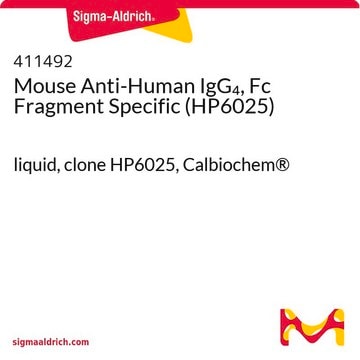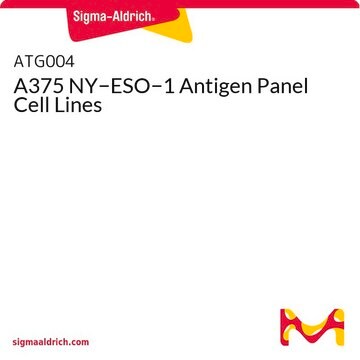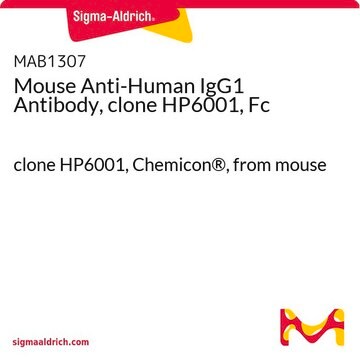411550
Mouse Anti-Human IgG, Fc Fragment Specific (HP6043) Peroxidase Conjugate
liquid, clone HP6043, Calbiochem®
Sign Into View Organizational & Contract Pricing
All Photos(1)
About This Item
UNSPSC Code:
12352203
NACRES:
NA.46
Recommended Products
biological source
mouse
Quality Level
antibody form
purified antibody
antibody product type
secondary antibodies
clone
HP6043, monoclonal
form
liquid
does not contain
preservative
manufacturer/tradename
Calbiochem®
storage condition
OK to freeze
avoid repeated freeze/thaw cycles
isotype
IgG
shipped in
wet ice
storage temp.
−20°C
Related Categories
General description
Purified mouse monoclonal antibody conjugated to horseradish peroxidase. Recognizes human IgG Fc fragment.
This Mouse Anti-Human IgG, Fc Fragment Specific (HP6043) Peroxidase Conjugate is validated for use in Enzyme Immunoassay for the detection of Human IgG, Fc Fragment Specific.
Application
Enzyme Immunoassay (1:1000, see application references)
Packaging
Please refer to vial label for lot-specific concentration.
Warning
Toxicity: Standard Handling (A)
Physical form
In PBS, 10 mg/ml BSA.
Other Notes
Antibody should be titrated for optimal results in individual systems.
Cross-reactivity by ELISA against human myeloma proteins:
Human IgG1: 100%
Human IgG2: 100%
Human IgG3: 100%
Human IgG4: 100%
Human IgM: <0.2%
Human IgA: <0.1%
Human IgE: <0.1%
Cross-reactivity by ELISA against chimeric antibodies:
Human IgG1: 100%
Human IgG2: 100%
Human IgG3: 100%
Human IgG4: 100%
Human IgM: <0.01%
Human IgA: <0.01%
Human IgE: <0.01%
There is no detectable binding to bovine, goat, horse sheep IgG, so these species sera can be used for assay blocking buffers. Modification of Nakane and Kawaoi method used for enzyme coupling.
Cross-reactivity by ELISA against human myeloma proteins:
Human IgG1: 100%
Human IgG2: 100%
Human IgG3: 100%
Human IgG4: 100%
Human IgM: <0.2%
Human IgA: <0.1%
Human IgE: <0.1%
Cross-reactivity by ELISA against chimeric antibodies:
Human IgG1: 100%
Human IgG2: 100%
Human IgG3: 100%
Human IgG4: 100%
Human IgM: <0.01%
Human IgA: <0.01%
Human IgE: <0.01%
There is no detectable binding to bovine, goat, horse sheep IgG, so these species sera can be used for assay blocking buffers. Modification of Nakane and Kawaoi method used for enzyme coupling.
Hamilton, R.G. 1993. Clin. Chem.39, 1988.
Hamilton, R.G. and Morrison, S.M. 1993. J. Immunolo. Meth.158, 107.
Hamilton, R.G. 1990. Ann. Biol. Clin.48, 473.
Hamilton, R.G., et al. 1988. J. Immunoassay.9, 275.
Hamilton, R.G., et al. 1987. Hybridoma6, 204.
Nakane, P.K. and Kawaoi A., 1974. J. Histochem Cytochem.22, 1084.
Hamilton, R.G. and Morrison, S.M. 1993. J. Immunolo. Meth.158, 107.
Hamilton, R.G. 1990. Ann. Biol. Clin.48, 473.
Hamilton, R.G., et al. 1988. J. Immunoassay.9, 275.
Hamilton, R.G., et al. 1987. Hybridoma6, 204.
Nakane, P.K. and Kawaoi A., 1974. J. Histochem Cytochem.22, 1084.
Legal Information
CALBIOCHEM is a registered trademark of Merck KGaA, Darmstadt, Germany
Not finding the right product?
Try our Product Selector Tool.
Storage Class Code
12 - Non Combustible Liquids
WGK
WGK 2
Flash Point(F)
Not applicable
Flash Point(C)
Not applicable
Certificates of Analysis (COA)
Search for Certificates of Analysis (COA) by entering the products Lot/Batch Number. Lot and Batch Numbers can be found on a product’s label following the words ‘Lot’ or ‘Batch’.
Already Own This Product?
Find documentation for the products that you have recently purchased in the Document Library.
Farhad Khosravi et al.
Biosensors, 7(2) (2017-04-20)
This study demonstrates the rapid and label-free detection of Interleukin-6 (IL-6) using carbon nanotube micro-arrays with aptamer as the molecular recognition element. Single wall carbon nanotubes micro-arrays biosensors were manufactured using photo-lithography, metal deposition, and etching techniques. Nanotube biosensors were
Farhad Khosravi et al.
Nanotechnology, 27(44), 44LT03-44LT03 (2016-09-30)
We demonstrate the rapid and label-free capture of breast cancer cells spiked in blood using nanotube-antibody micro-arrays. 76-element single wall carbon nanotube arrays were manufactured using photo-lithography, metal deposition, and etching techniques. Anti-epithelial cell adhesion molecule (anti-EpCAM), Anti-human epithelial growth
Farhad Khosravi et al.
Nanotechnology, 27(13), 13LT02-13LT02 (2016-02-24)
We demonstrate the rapid and label-free capture of breast cancer cells spiked in buffy coats using nanotube-antibody micro-arrays. Single wall carbon nanotube arrays were manufactured using photo-lithography, metal deposition, and etching techniques. Anti-epithelial cell adhesion molecule (EpCAM) antibodies were functionalized
Tiina Kelkka et al.
Leukemia, 36(9), 2317-2327 (2022-08-05)
In immune aplastic anemia (IAA), severe pancytopenia results from the immune-mediated destruction of hematopoietic stem cells. Several autoantibodies have been reported, but no clinically applicable autoantibody tests are available for IAA. We screened autoantibodies using a microarray containing >9000 proteins
Our team of scientists has experience in all areas of research including Life Science, Material Science, Chemical Synthesis, Chromatography, Analytical and many others.
Contact Technical Service








